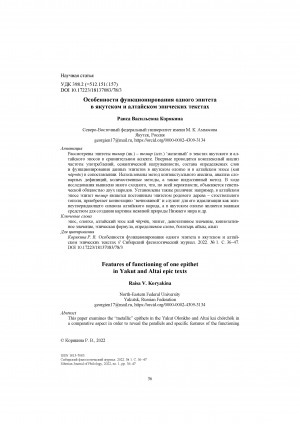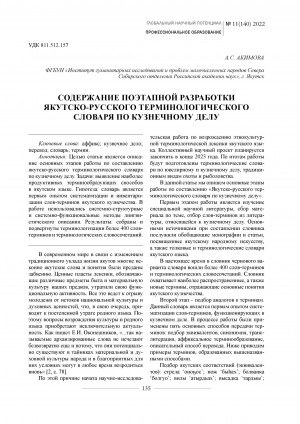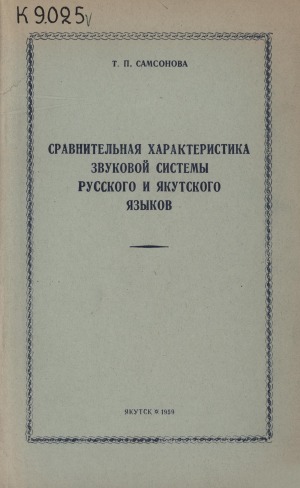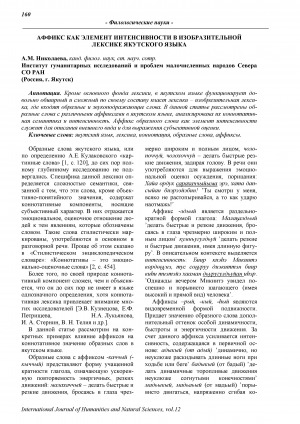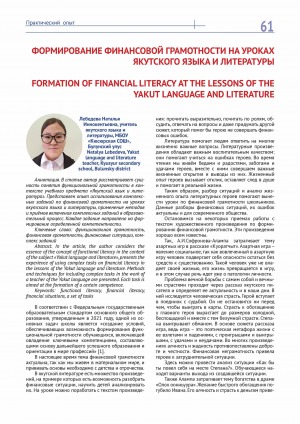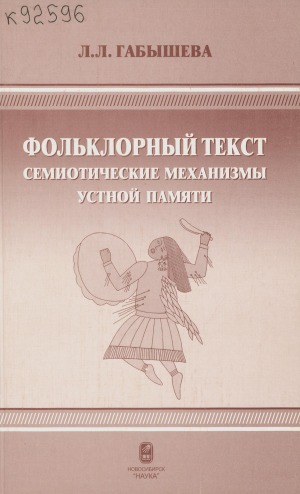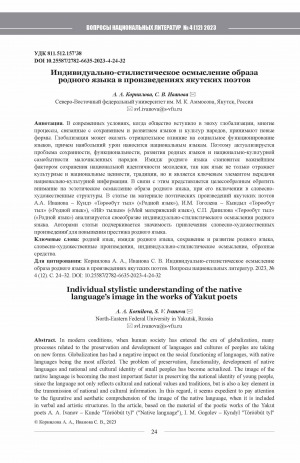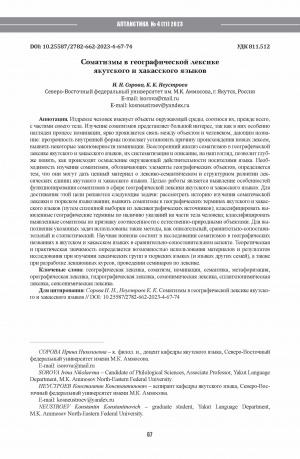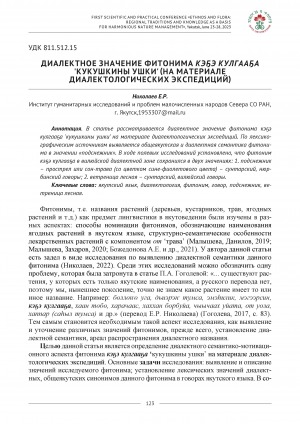Количество страниц: 14 с.
This paper addresses the semantics of dialectal names of mutovka (a stick with branches at the end used for mixing or stirring), with all of them belonging to the lexical-thematic microgroup “Utensils” in the Yakut language. Over 40 dialect names of mutovka with different connotations have been identified in dialectological, lexicographical, and ethnographic materials. The nomination principles of mutovka are determined on the external form and functions. The form and structure of mutovka s (round, branched, cross-shaped), material (wood, cow horn) depend on their purpose. Mutovka has different functions: for whipping koumiss, cream, or butter, and others, with the movement of the tool also of importance for nomination. The basic characteristic of any mutovka is ytyyyy “mixing, stirring, and churning.” The comparative analysis revealed that the Yakut lexemes ytyk and bhiheyeh indicate a common Turkic similarity. Most names of mutovka are part of the lexical fund of the Yakut language developed in the linguistic landscape of modern Yakuts (Sakha). Also, the dialect names bilier, biriel “kumys mutovka” have been found to have Mongolian roots. A semantic description allowed the origin of khamnatar “kumys mutovka” to be determined as an apotropaic lexeme with both all-Yakutian and dialectal meaning. The semantics of the mutovka names concerned reflects the cattle-breeding culture of Yakuts (Sakha) developed and spread in the subcontinental climate in the vast territory of the North-East of Russia. The findings specify the lexical-semantic microgroups “Tableware,” “Utensils” to “Kumys ware and utensils,” “Ytyk,” to compile the thematic lists of Yakut household culture.
Николаев, Е. Р. Диалектные наименования мутовки в якутском языке (на материале лексикографических источников) / Е. Р. Николаев ; Институт гуманитарных исследований и проблем малочисленных народов Севера // Сибирский филологический журнал. - 2023. - N 2. - С. 194-207. - DOI: 10.17223/18137083/83/15
DOI: 10.17223/18137083/83/15
Количество страниц: 12 с.
- Языкознание. Филология. Художественная литература > Языкознание и языки. Лингвистика > Якутский (саха),
- Языкознание. Филология. Художественная литература > Языкознание и языки. Лингвистика > Другие языки,
- НАУКА ЯКУТИИ > ЯЗЫКОЗНАНИЕ. ФИЛОЛОГИЯ. ЛИТЕРАТУРОВЕДЕНИЕ. ХУДОЖЕСТВЕННАЯ ЛИТЕРАТУРА > Языкознание и языки. Лингвистика.
This paper examines the “metallic” epithets in the Yakut Olonkho and Altai kai chӧrchӧk in a comparative aspect in order to reveal the parallels and specific features of the functioning of these epithets in the epic of peoples related in the historical past. The following methods were used: contextual analysis, analysis of dictionary definitions, quantitative methods, and the inductive method, which allows generalizing the results of applying all the methods. The comparative study revealed many similarities. In both epics, metal epithets in the structure are radical, derived from the lexeme denoting the name of the metal. In a denotative meaning, they characterize objects by the material from which they are made. The choice of specific metallic epithets as contextual synonyms in the structure of the epic formula is due to the phenomenon of vowel harmony inherent in most Turkic languages. The genetic community of the Yakut and Altai peoples probably explains the similar features of the metallic epithets. Also, the differences have been established: according to the frequency of using the epithets formed from the nominations of precious metals, the ancient Yakuts preferred silver, and the Altai people preferred gold. The differences and peculiarities of functioning of “metal” epithets in the Yakut and Altai epic texts can be explained by the stage difference in the development of the epic texts compared.
Корякина, Р. В. Особенности функционирования одного эпитета в якутском и алтайском эпических текстах / Р. В. Корякина ; Северо-Восточный федеральный университет им. М. К. Аммосова // Сибирский филологический журнал. - 2022. - N 1. - С. 36-47. - DOI: 10.17223/18137083/78/3
DOI: 10.17223/18137083/78/3
Количество страниц: 3 с.
The purpose of the article is to describe the main stages of work on compiling the Yakut-Russian terminological dictionary on blacksmithing. The objectives are to identify the most productive term-forming methods in the Yakut language. The hypothesis is as follows: the dictionary is the first experience of systematization and inventory of the words-terms of the Yakut blacksmithing. The work used system-structural and system-functional methods of linguistic description. The results are as follows: more than 400 words-terms and terminological phrases were collected and subjected to terminology.
Акимова, А. С. Содержание поэтапной разработки якутско-русского терминологического словаря по кузнечному делу / А. С. Акимова ; Институт гуманитарных исследований и проблем малочисленных народов Севера // Глобальный научный потенциал. - 2022. - N 11 (140). - С. 135-137.
Издательство: Якутское книжное издательство
Год выпуска: 1959
Количество страниц: 98 с.
Количество страниц: 3 с.
Николаева, А. М. Аффикс как элемент интенсивности в изобразительной лексике якутского языка / А. М. Николаева ; Институт гуманитарных исследований и проблем малочисленных народов Севера // Международный журнал гуманитарных и естественных наук. - 2017. - N 12. - C. 160-162.
Количество страниц: 2 с.
- Общественные науки. Образование > Народное образование. Воспитание. Обучение. Организация досуга > Общеобразовательная школа. Дошкольные учреждения,
- Языкознание. Филология. Художественная литература > Языкознание и языки. Лингвистика > Якутский (саха),
- Языкознание. Филология. Художественная литература > Литература. Литературоведение > Теория литературы. Изучение литературы. Литературная техника > Художественная литература на отдельных языках > Якутская (саха) литература,
- НАУКА ЯКУТИИ > ОБЩЕСТВЕННЫЕ НАУКИ > Народное образование. Воспитание. Обучение. Организация досуга > Общеобразовательная школа. Дошкольные учреждения,
- НАУКА ЯКУТИИ > ЯЗЫКОЗНАНИЕ. ФИЛОЛОГИЯ. ЛИТЕРАТУРОВЕДЕНИЕ. ХУДОЖЕСТВЕННАЯ ЛИТЕРАТУРА > Литература. Литературоведение,
- НАУКА ЯКУТИИ > ЯЗЫКОЗНАНИЕ. ФИЛОЛОГИЯ. ЛИТЕРАТУРОВЕДЕНИЕ. ХУДОЖЕСТВЕННАЯ ЛИТЕРАТУРА > Языкознание и языки. Лингвистика.
In the article, the author considers theessence of the concept of functional literacy in the contextof the subject ҺYakut language and literatureһ, presents theexperience of using complex tasks on financial literacy inthe lessons of the Yakut language and literature. Methodsand techniques for including complex tasks in the work ofa teacher of the Yakut language are presented. Each task isaimed at the formation of a certain competence.
Лебедева, Н. И. Формирование финансовой грамотности на уроках якутского языка и литературы / Н. И. Лебедева ; МБОУ "Кюсюрская средняя общеобразовательная школа" // Народное образование Якутии. - 2023. - N 1 (126). - С. 61-62.
Издательство: Наука
Год выпуска: 2009
Количество страниц: 148 с.
Количество страниц: 9 с.
- Языкознание. Филология. Художественная литература > Языкознание и языки. Лингвистика > Якутский (саха),
- Языкознание. Филология. Художественная литература > Литература. Литературоведение > Теория литературы. Изучение литературы. Литературная техника,
- НАУКА ЯКУТИИ > ЯЗЫКОЗНАНИЕ. ФИЛОЛОГИЯ. ЛИТЕРАТУРОВЕДЕНИЕ. ХУДОЖЕСТВЕННАЯ ЛИТЕРАТУРА > Языкознание и языки. Лингвистика,
- НАУКА ЯКУТИИ > ЯЗЫКОЗНАНИЕ. ФИЛОЛОГИЯ. ЛИТЕРАТУРОВЕДЕНИЕ. ХУДОЖЕСТВЕННАЯ ЛИТЕРАТУРА > Литература. Литературоведение.
Корнилова, А. А. Индивидуально-стилистическое осмысление образа родного языка в произведениях якутских поэтов / А. А. Корнилова, С. В. Иванова ; Северо-Восточный федеральный университет им. М. К. Аммосова // Вестник Северо-Восточного федерального университета им. М. К. Аммосова. Серия: Вопросы национальных литератур. - 2023. - N 4 (12). - С. 24-32. - DOI: 10.25587/2782-6635-2023-4-24-32
DOI: 10.25587/2782-6635-2023-4-24-32
Количество страниц: 8 с.
- Языкознание. Филология. Художественная литература > Языкознание и языки. Лингвистика > Якутский (саха),
- Языкознание. Филология. Художественная литература > Языкознание и языки. Лингвистика > Тюркские языки,
- НАУКА ЯКУТИИ > ЯЗЫКОЗНАНИЕ. ФИЛОЛОГИЯ. ЛИТЕРАТУРОВЕДЕНИЕ. ХУДОЖЕСТВЕННАЯ ЛИТЕРАТУРА > Языкознание и языки. Лингвистика.
Сорова, И. Н. Соматизмы в географической лексике якутского и хакасского языков / И. Н. Сорова, К. К. Неустроев ; Северо-Восточный федеральный университет им. М. К. Аммосова // Вестник Северо-Восточногофедерального университета им. М. К. Аммосова. Серия "Алтаистика". - 2023, N 4 (11). - 67-74. - DOI: 10.25587/2782-662-2023-4-67-74
DOI: 10.25587/2782-662-2023-4-67-74
Количество страниц: 5 с.
Николаев, Е. Р. Диалектное значение фитонима кэҕэ кулгааҕа'кукушкины ушки' : (на материале диалектологических экспедиций) / Николаев Е. Р. ; Институт гуманитарных исследований и проблем малочисленных народов Севера // Этносы и флора: региональные традиции и знания как основа гармоничного природопользования : материалы первой научно-практической конференции, 23-28 июня 2023 г., Якутск = Ethnic groups and Flora: regional traditions and knowledgeas a basis forharmonious nature management : proceedings of the First scientific and practical conference, June 23-28, 2023, Yakutsk / [редакционная коллегия: А. В. Кононов, Н. С. Иванова]. - Якутск : Издательский дом СВФУ, 2023. - 1 файл (275 с. ; 24,0 Мб). - С. 123-128.

